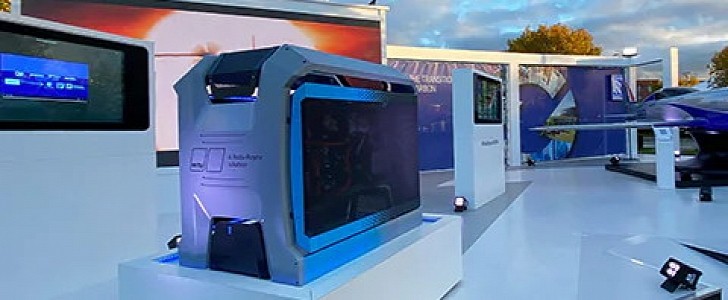'MAYBE' TECH
Rolls-Royce’s Future Hydrogen Fuel Cell Module Could Power Ten Houses
9 Nov 2021, 07:11 UTC
One of the most interesting products on display at the UN Climate Change Conference COP26 in Glasgow was a hydrogen fuel cell module presented by Rolls-Royce. The brand’s Power Systems business unit has joined forces with cellcentric to create highly-efficient fuel cell solutions for emergency power generation.



With a minimalistic design and H-shaped front panel, Rolls-Royce’s mtu fuel cell element is a good example of future technology. This modern-looking module will be able to generate a net power output of 150 kW, enough to power ten homes. But its clean power is meant to be used as a backup for large data centers. Multiple modules can also be connected into fuel cell power plants for impressive megawatts outputs.
This fuel cell module is the result of a collaboration between Rolls-Royce and cellcentric, the joint venture set up by Daimler Truck and Volvo earlier this year. The mtu hydrogen fuel cell solution will be developed based on cellcentric’s fuel cell modules. Hydrogen is promoted as a viable alternative for fossil fuels, but it’s also considered a key element for climate-neutral telecommunications and internet traffic. These domains are linked to huge data centers that require large amounts of energy. So, why not make this clean energy?
Andreas Schell, CEO of Rolls-Royce Power Systems, said that the company is ready to invest heavily in fuel cell research and development over the next years, because it sees it as the answer for carbon neutrality. By using green hydrogen, which is obtained through renewable energy sources, fuel cells become a climate-friendly alternative. The goal is to reduce the CO2 footprint of large data centers that use a lot of energy.
The Daimler-Volvo joint venture intends to accelerate series production and install its fuel cell modules on heavy-duty utility vehicles in the second half of this decade. At the same time, Rolls-Royce will introduce pilot fuel cell power plants with customers in 2023.
Standard production of fuel cell systems is set to kick off in 2025, with an ambitious goal – more than half of the data centers should switch to power from fuel cells in the near future.

No comments:
Post a Comment